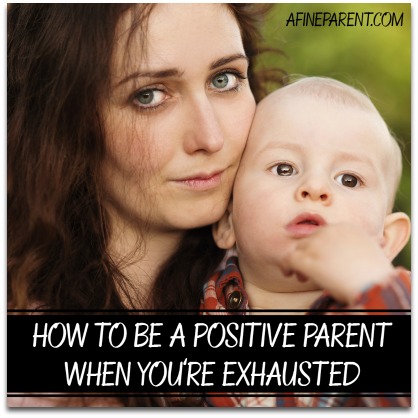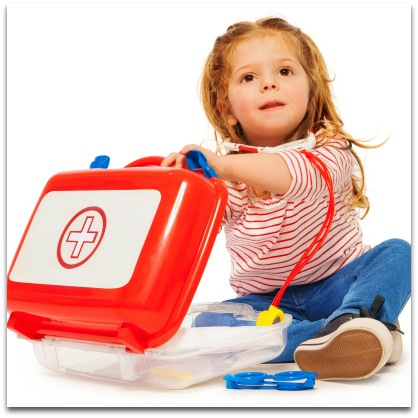 We don’t do anything well when we’re tired.
We don’t do anything well when we’re tired.
We don’t drive well, perform surgery well or screen airline baggage well when we’re tired.
And as millions of us know from experience, we don’t parent well either.
Science gives us some clues as to why. When we don’t get enough sleep, the frontal and parietal control regions of the brain don’t raise activation as well as normal, and there is reduced activation in the visual sensory cortex.
In plain language, our brains don’t work right. Studies have found that just one night without sleep causes impairment in tasks requiring flexible thinking, that people who are sleep deprived are more irritable (duh!) and that sleep deprivation makes it difficult to multitask.
So why do we expect ourselves to be good parents when we’re exhausted?
Maybe because being tired seems like the very definition of parenthood. Newborn babies wake frequently to eat, older babies and toddlers wake from teething pain and separation anxiety, older children wake when they have nightmares, and everyone sleeps poorly when they’re sick.
Luckily, most sleep disturbances are relatively short-lived, and research suggests that our brains go back to normal after getting some good sleep. But until we can get that sleep, how do we manage our children and maintain our commitment to positive parenting?
As the mother of two children who regularly wake me up in the middle of the night (often repeatedly!), I have a lot of experience parenting with minimal sleep. I’ve learned that although it’s hard to be the parent I want to be when I’m tired, it is possible if I keep a few simple things in mind.
Below are some of the tricks I’ve learned to be the best parent I can be when I’m tired.
1: The Obvious. Get Some Sleep! (Even If It Is a Quick Nap)
 When you’re tired, the best thing you can do for yourself and your kids is to go to sleep. This seems obvious, but it’s remarkable how often we overlook it with the mistaken idea that it’s more important to do the dishes, send some emails or plan our kid’s upcoming birthday party.
When you’re tired, the best thing you can do for yourself and your kids is to go to sleep. This seems obvious, but it’s remarkable how often we overlook it with the mistaken idea that it’s more important to do the dishes, send some emails or plan our kid’s upcoming birthday party.
The truth is that we cannot be the parents we want to be when we’re tired. So, if you’re exhausted and have the opportunity to sneak in a nap, do it! Even a short nap can transform your mood and give you back some of the patience needed to parent well.
If you aren’t able to sleep right now, make a plan for getting some sleep as soon as possible. Promise yourself that you’ll lie down while your kids nap this afternoon (if they do nap) or that you’ll go to sleep immediately after you get them in bed tonight. Just knowing that you will get to sleep soon can help you relax and focus on being a good parent now.
If you’re struggling with ways to make it possible to get more sleep, consider some of these options:
- Take turns with your partner so that one of you naps while the other watches the kids, and then you switch.
- Ask an extended family member, friend, or neighbor to watch your kids while you nap.
- Arrange an impromptu playdate at a friend’s house so that you can nap while your kids play somewhere else.
- Hire a babysitter or a night nurse.
- When you are waiting for a child to finish a class (gymnastics, art, soccer, etc.), set an alarm on your phone and snooze in the car.
2: Make a Parenting-While-Exhausted Plan
No matter how hard you try to avoid it, there will always be times when you have to parent while exhausted. You can help make those times better if you think ahead and make a plan for how to handle difficult situations the moment you realize you’re overtired.
It’s much easier to handle difficult situations if you’ve planned ahead. Making snap decisions, especially when you’re tired, makes it harder to stay calm and avoid doing something you might regret, like yelling at your kids.
When you get up in the morning after a long, sleepless night, take a moment to recognize that you’re going to struggle with parenting today. Then think of a few parenting strategies that feel easy and natural for you and make a note of them on a white board or on your phone.
Avoid any strategies – no matter how good they might be – if they require a lot of effort. What’s easy for one person might be difficult for another, so your plan might be different from someone else’s. For example, it doesn’t come naturally to me to use humor when my kids act up, so this isn’t a good strategy for me when I’m tired, but one of my friends finds this very natural and uses it as her go-to approach most of the time.
For me, the simplest and most natural approach when I’m tired is to make a plan like this: “If my kids do something that makes me angry today, I will tell them I’m upset with their behavior and redirect them to do something else… anything at all that distracts them is fine today, even if I wouldn’t normally choose it on a regular day.”
Today isn’t the day to get creative or try new strategies. Keep it simple.
3: Give Yourself a Break from Proactive Parenting
 You’re trying to cook dinner while holding a fussy baby, and suddenly you hear a racket in the next room. You rush over to find your three-year-old and five-year-old hitting each other and screaming in foul language. The positive parent in you wants to calmly tell them to stop and have a thorough discussion about how hitting hurts, how they need to respect and be kind to each other and how swear words are not appropriate language.
You’re trying to cook dinner while holding a fussy baby, and suddenly you hear a racket in the next room. You rush over to find your three-year-old and five-year-old hitting each other and screaming in foul language. The positive parent in you wants to calmly tell them to stop and have a thorough discussion about how hitting hurts, how they need to respect and be kind to each other and how swear words are not appropriate language.
But you only got three hours of sleep last night, your arm hurts from holding the baby and you’re tempted to fly off the handle. You worry that you haven’t been teaching them about respecting and blame yourself for their foul language (didn’t you say a bad word when that person cut you off in the car yesterday?). You wonder if you need to do something drastic to get through to them – like yelling or sending them to their rooms, or maybe even spanking!
STOP.
Take a deep breath and recognize that you’re exhausted and it’s harder than normal to react the way you want to. Tell yourself that today you’re “taking a break from proactive parenting.”
What does this mean? It means that you give yourself a pass on teaching lessons. Today is not the day for teaching your kids to take responsibility or helping them develop a sense of delayed gratification. Today is not the day for teaching your kids to not to swear and not to use physical violence to get what they want.
When you’re rested, you can be a proactive parent, teaching your kids important life lessons and guiding their moral development. But today you’re in survival mode. Your job today is to treat your children respectfully, make sure no one gets hurt, fall back on what you decided in #2 above and get out of the way so you don’t undo any of your positive parenting efforts so far. Big conversations can wait for another day.
 Being exhausted and mentally strong at the same time may feel like an oxymoron. We partnered with Amy Morin, psychotherapist, professor, and best-selling author, to better understand how we can distinguish the difference between mental strength and acting tough and how we can master our own mental strength in order to raise resilient kids in the Mental Strength Masterclass.This packed masterclass is one of the 70+ masterclasses you get when you join the AFineParent Academy today. Click here to learn more.
Being exhausted and mentally strong at the same time may feel like an oxymoron. We partnered with Amy Morin, psychotherapist, professor, and best-selling author, to better understand how we can distinguish the difference between mental strength and acting tough and how we can master our own mental strength in order to raise resilient kids in the Mental Strength Masterclass.This packed masterclass is one of the 70+ masterclasses you get when you join the AFineParent Academy today. Click here to learn more.4: Postpone Productivity
Under normal circumstances, you might be able to do a few household chores or check some emails on your phone while you’re with your kids. But when you’re tired, multitasking is harder than usual, and you aren’t able to respond as calmly if your kids get into trouble while you’re distracted.
Imagine this: you start putting dirty clothes into a laundry bin to take to the washing machine, but your toddler makes a game of removing the clothes as soon as you put them into the bin, and your older child runs around with dirty underwear on his head, pretending to be a superhero. On another day, this might be funny, but today you’re tired, and it makes you mad. You snatch the clothes out of your toddler’s hands angrily and yell at your older kid. Both kids start crying, and you feel terrible. This is not the way you want to parent.
To avoid this, keep productivity to a bare minimum until you feel more rested. As long as everyone is eating and wearing clothes, you can and should put off almost everything else for another day. And as a cautionary tale, here are some hilarious stories of what happened when super-tired moms tried to get things done.
5: Avoid Triggers
 Every family has a few “triggers” – circumstances or situations that make it more likely for you to get angry, or more likely for your kids to do something they aren’t supposed to do. It’s a good idea to know what your unique triggers are so that you can avoid them today, by hook or crook.
Every family has a few “triggers” – circumstances or situations that make it more likely for you to get angry, or more likely for your kids to do something they aren’t supposed to do. It’s a good idea to know what your unique triggers are so that you can avoid them today, by hook or crook.
One of my triggers is noise. If it’s too loud, I get really stressed out. I have a hard time focusing on what people are saying, I feel rushed, and I have the sense that everyone is shouting at me. It makes me much more likely to be irritable if there’s loud noise in the background.
So, when I’m tired, I make sure we don’t turn on music, no matter how much fun a family dance party seems, and I hide away loud toys like drums, whistles and tambourines before my kids can find them.
Kids also have triggers that make them more likely to “misbehave.” For example, my son tends to get frustrated when I’m making dinner because he’s bored and wants my attention. He’s fine when I make breakfast or lunch, but by dinnertime, he’s too tired to control himself. Instead of just asking for my attention, he finds a way to get it by knocking something over, playing too rough with the dog or climbing on things he shouldn’t.
When I’m well rested, I have the energy to help him feel like he has my attention while I cook so that these things don’t happen, but when I’m tired, it’s harder to do this. Knowing this helps me be prepared so that I can order delivery or make a very, very simple dinner that night.
Similarly, if you know that your kids usually fight over the toy trains, put the train set away for the day. If you know your kid gets crazy when she eats sugar, don’t give her cookies at snack time. The more you can do to avoid triggers, the easier it will be to remain a peaceful, calm parent.
6: Bring Out Activities or Toys Your Kids Love
Are there some activities or toys your kids almost always love? Are there things they could spend hours doing? Today is a great day to encourage them to do these things because it will mean less effort for you. If they’re happily amused, you won’t have to field complaints about “being bored,” and everyone is more likely to get along.
A few activities that work for my kids are art activities and sensory activities (search Pinterest for ideas ranging from water beads and DIY playdough to dry beans and rice, and more).
New toys are another good bet (although they do run the risk of creating animosity between siblings). If you’re at the grocery store and feeling overwhelmed, consider buying that cheap plastic toy your kid has been begging for. Better yet, if you have a toy rotation system, now is a good time to dig out some toys you’ve put away. They’ll seem “new” to your kids but won’t require you to spend money or add clutter to your home.
If you’re planning ahead for the future, you might also consider making activity boxes. With a few cheap items, you can create novel, exciting activities that keep your kids busy and happy for at least a little while.
7: Discover Games that Let You Rest
These games are fun anytime but can be a lifesaver when you’re tired. Here are a few suggestions:
a. Family Slumber Party
Enlist your kids’ help in gathering all the pillows and blankets they can find in the house. Also invite them to get creative and gather other things, like sleeping bags, stuffed animals, bean bags, couch cushions and anything else they can think of that’s soft. Pile everything on the floor in your living room or family room and use the blankets to make a fort by draping them over the top of chairs or other pieces of furniture. Fill the fort with the cushions, pillows, stuffed animals and extra blankets.
In my family, we like to turn off the lights and play inside the fort with flashlights. We usually read books, tell stories and pretend to be wolves in a den. This is a great way to have fun as a family and give yourself a chance to lay down! This also works well for kids who are tired but refuse to nap.
b. Doctor Game
 If your child has a doctor set, use it. Otherwise, scrounge up supplies from around your kitchen and your first aid kit (a wet towel, cotton balls, shrink wrap or aluminum foil, a few band aids, boo-boo pads from your freezer, etc.)
If your child has a doctor set, use it. Otherwise, scrounge up supplies from around your kitchen and your first aid kit (a wet towel, cotton balls, shrink wrap or aluminum foil, a few band aids, boo-boo pads from your freezer, etc.)
Now it is time for you to be the “patient”, so lie down and be comatose while your little doctors try to set that fracture in your leg and revive you.
c. Tattoo / Massage Game
Spread out an old blanket and lie down on it. Give your kids a few washable markers and your bare legs. Ask them to surprise you with the cutest tattoo they can come up with! Alternately, give them a small bowl of baby oil. Lie down and let them massage your back or arm or leg. Tell them the shinier they make you the better masseuse they are. The tattoo/massage game is a perfect excuse for you to relax while at the same time “playing” with your kids!
8: When All Else Fails, Allow Some Screen Time
Screen time isn’t great for kids, and many of us are concerned about how much time our kids spend watching TV or using tablets or computers.
But let’s face it: an hour of watching Frozen or playing a train game on the tablet is probably better for your kids than if you yell at them about some small thing they did because you’re overtired.
If all else fails and you just need a break, set the kids up with some wholesome programming, and do whatever it is you need to do (take a nap, finish dinner, take a shower, etc.). No matter what your opinion on screen time is, we can all agree that small amounts of screen time in controlled situations is unlikely to harm your child.
The 2-Minute Action Plan for Fine Parents
This article is about how to remain a positive parent even when you’re exhausted, but the hope is that you will only be truly exhausted for a short time once in a while. To make sure this is not a chronic problem, take a moment now to assess your sleep routine and look for ways to improve the quantity and quality of your sleep.
- On average, how often are you sleep-deprived and exhausted?
- Is this reasonable? Can you do anything to reduce these instances?
- What can you do to get more and better sleep every night?
- What is are some of your triggers when you are exhausted?
- What are some of the go-to parenting techniques you can rely on when exhausted so you don’t undo your positive parenting from other days?
The Ongoing Action Plan for Fine Parents
It’s also a good idea to plan ahead for the times when you’ll be overtired in the future (because you know there will be times!)
To prepare for those times:
- Make a list of people you can ask for help when you really need it (i.e., your partner, extended family members, neighbors, friends, babysitters, etc.).
- Create a toy rotation system so you can bring out some old toys when you are tired and kids can have something “new” to play with, without you having to spend a fortune on toys.
- Think of some activities your kids really enjoy and can be engaged by for a little while on their own (you might also consider making activity boxes).
Being a good parent is a challenge on a good day and can seem downright impossible when you’re exhausted. But with a little planning and an ongoing commitment to being a positive parent, you can make sure that your parenting style doesn’t change too much, even when you’re tired!


You’re not a failure! It’s hard to parent when you’re tired, and it’s hard not to be tired when you’re a parent, facing all the parenting challenges, sleep disruptions, and conflicting responsibilities that parents face. I hope some of these tips and recommendations can help a little!
Thanks for this realistic and compassionate article. I tend to feel like a failure when I’m overtired and can’t parent well, and it’s so helpful to hear I’m not alone.
You’re not a failure! It’s hard to parent when you’re tired, and it’s hard not to be tired when you’re a parent, facing all the parenting challenges, sleep disruptions, and conflicting responsibilities that parents face. I hope some of these tips and recommendations can help a little!
Great! I can get more sleep simply by getting more sleep! Can’t believe I never thought of that.
Best article I’ve read in months! My oldest is 9 and I thought by now I knew all the tricks in the bag lol I had a migraine today from being sleep deprived and I desperately needed to hear these words! Thank you so much!!!
I’m so glad this was useful to you. Sleep deprivation is terrible, isn’t it? And migraines are no joke. I hope you are feeling better and get some rest soon!
Hi Katherine,
Wonderful article. It was very validating as I frequently use some of these techniques albeit with some guilt:)….. but that’s getting better.
I think at the core of every experience (including mindful parenting) is the fact: To Know Yourself..
Wishing all the best to you and to all the Moms out there;not forgetting the Dads (but we really need more of it😊)
Thanks, Fouzia! You’re so right that knowing yourself and knowing your needs and limits is important to parenting well — but can be hard to remember!
I, too, struggle with guilt, and I think a lot of parents do. It’s hard to balance wanting to give your children the world while also needing to take care of yourself so that you can be a good parent. Parents definitely deserve a big pat on the back for everything they do!
Hey Katherine,
Thank you for this. I’m an exhausted parent, myself, and my son is only 5 months old. A lot of your tips here are super useful for toddlers and up, so this article is saved as a good reference in the future.
Thank you again for the insightful advice.
Hi Joshua. Thanks for your note. Lack of sleep can be so hard!
I saw your video about your son — I hope he’s doing okay. Your experience sounds so scary. Both of my kids were hospitalized as infants, and although it wasn’t for anything as serious as botulism, it was terrifying and overwhelming. I hope your son is doing better now and that you all are hanging in there!
This is one of the best articles you’ve posted. Great ideas, especially the one under Create a Game. Very creative and affective.
Thank you! I’m glad you enjoyed the article.
So glad you liked it, Edie. I personally love this article too and the “doctor game” used to be my favorite when my daughter was little 🙂